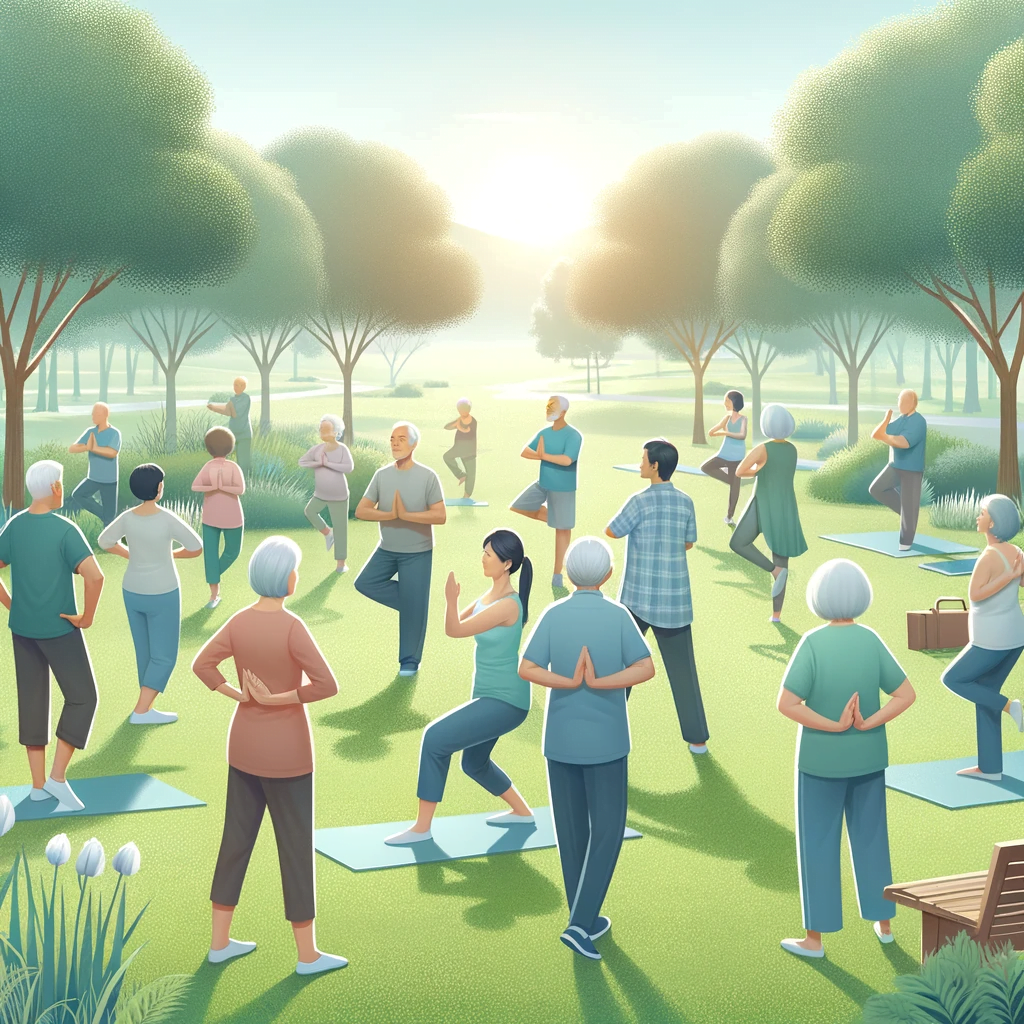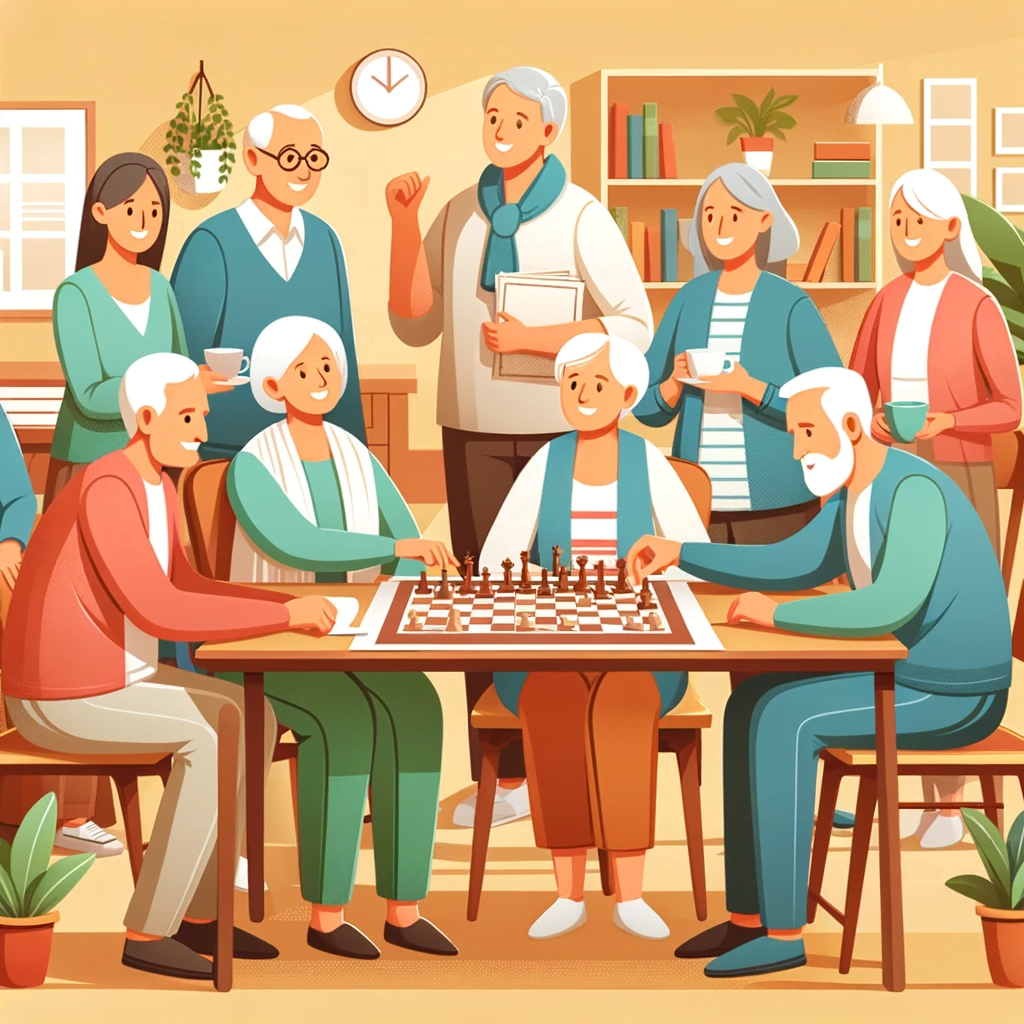Best New Year’s Resolutions for Seniors in 2024
Introduction – New Year’s Resolutions for Seniors in 2024
As the calendar turns to 2024, it’s a time of reflection and goal-setting for people of all ages. For seniors, New Year’s resolutions are more than just annual commitments; they are a gateway to enhanced well-being and a more fulfilling lifestyle. This article delves into the best New Year’s resolutions for seniors, offering a roadmap to a year filled with health, happiness, and personal growth.
Health and Wellness Resolutions – Resolutions for Seniors in 2024

Prioritizing Physical Health
Regular, Age-Appropriate Exercise: Physical activity is not just about staying fit; it’s about maintaining independence and quality of life for seniors. Regular exercise helps in retaining muscle strength, enhancing balance to prevent falls, and improving cardiovascular health, which is crucial for preventing heart diseases. Walking is a low-impact exercise that can be easily incorporated into daily routines. It improves circulation, strengthens muscles, and enhances mood. Yoga, tailored for seniors, helps in maintaining flexibility, reducing joint pain, and promoting mental calmness. Water aerobics is another excellent choice, especially for those with arthritis or mobility issues, as the buoyancy of water reduces stress on joints while providing resistance for strengthening muscles.
Routine Health Check-Ups: Regular health check-ups are essential for early detection and management of age-related health issues like diabetes, osteoporosis, or heart conditions. Regular visits to a primary care physician can help in monitoring and managing chronic conditions. Eye exams are crucial for detecting age-related vision problems such as cataracts or glaucoma. Similarly, hearing tests, dental check-ups, and screenings for cancers should be part of a senior’s health routine. These check-ups can also be an opportunity for seniors to discuss nutrition, mental health, and any concerns they might have about their health with their healthcare providers.
Balanced Diet and Hydration: A balanced diet for seniors should focus on nutrient-dense foods that provide the necessary vitamins and minerals while being easy to digest. Incorporating a variety of fruits and vegetables ensures a high intake of essential vitamins, fibers, and antioxidants. Lean proteins, such as fish, poultry, beans, and legumes, are important for muscle maintenance and repair. Whole grains provide necessary carbohydrates for energy, along with fiber. Seniors should also ensure they are consuming enough calcium and vitamin D for bone health. Hydration is equally important, as older adults are more prone to dehydration, which can impact kidney function, cognition, and overall health.
Focusing on Mental Health
Activities for Mental Agility: Cognitive activities like puzzles, reading, and learning new skills have been linked to a lower risk of cognitive decline. Engaging in these activities stimulates the brain and can improve memory, focus, and problem-solving skills. For instance, crossword puzzles or Sudoku can be a fun way to keep the mind active. Reading keeps the brain engaged and can be a window to new ideas and worlds, enhancing knowledge and empathy. Learning new skills, such as a new language, a musical instrument, or a craft, not only provides mental stimulation but also a sense of achievement and confidence.
Social Interactions:Social interactions play a vital role in a senior’s mental health. Isolation and loneliness can lead to depression and a decline in mental function. Regular interactions with family and friends provide emotional support and a sense of belonging. Participating in group activities, whether they are exercise classes, book clubs, or community events, provides opportunities for socialization, which is essential for maintaining mental health. These interactions can also provide cognitive stimulation and a sense of community.
Stress Management: Managing stress is crucial for mental well-being. Techniques like meditation and tai chi can be particularly beneficial for seniors. Meditation helps in reducing stress, improving concentration, and promoting emotional health. Tai chi, often described as “meditation in motion,” combines gentle physical exercise and stretching with mindfulness. Engaging in hobbies, whether it’s gardening, painting, or cooking, can also be a great stress reliever. These activities provide a sense of purpose and joy, taking the focus away from daily stressors and contributing to overall mental wellness.
Social Engagement and Relationships – Resolutions for Seniors in 2024

Strengthening Social Ties
Joining Senior-Focused Clubs: Senior-focused clubs and groups are not just about socializing; they’re a platform for shared experiences and learning. Many communities have clubs that cater to a variety of interests – from book clubs and gardening groups to walking clubs and craft circles. These clubs offer a supportive and understanding environment where seniors can form new friendships, engage in meaningful conversations, and find a sense of belonging. The activities in these clubs often are tailored to accommodate different physical abilities, ensuring inclusivity.
Interaction with Family and Friends: Maintaining close relationships with family and friends is vital for emotional well-being. Regular interaction, whether through visits, phone calls, or modern communication methods like video calls, helps in reinforcing these bonds. These interactions not only provide emotional support but also a sense of continuity and connection to the wider world. For seniors, especially those living alone or in care facilities, these connections can be a crucial link to their past and a source of comfort.
Using Technology: The digital divide can often leave seniors feeling disconnected, but learning to use technology can bridge this gap. Understanding how to use social media platforms allows seniors to keep up with the lives of their loved ones, engage in digital communities, and even reconnect with old friends. Video calling apps bring a visual element to conversations, making them more personal. Moreover, being adept with technology can help seniors access online resources and services, enhancing their independence and knowledge.
Community Involvement
Volunteering: Volunteering offers seniors a chance to give back to the community, share their wealth of experience, and stay active and engaged. Many nonprofit organizations and community projects seek out seniors for their reliability, skills, and wisdom. Whether it’s mentoring, teaching, or helping with community gardening, volunteering provides a sense of accomplishment and connection to the broader community.
Local Events: Participation in local events, like fairs, concerts, educational talks, or art exhibitions, keeps seniors connected to the cultural heartbeat of their community. These events offer opportunities to socialize, learn, and enjoy new experiences. They also help seniors feel more integrated into the community, fostering a sense of belonging and community pride.
Intergenerational Connections: Activities that encourage interaction between different generations can be incredibly rewarding. Programs that pair seniors with younger people – in schools, mentorship programs, or community projects – provide mutual benefits. Seniors can share their life experiences and wisdom, while younger participants bring new perspectives and energy. These interactions can help break down generational barriers and stereotypes, fostering mutual understanding and respect.
Personal Development – Resolutions for Seniors in 2024
Lifelong Learning
Exploring New Hobbies: Taking up new hobbies or revisiting old ones is not just about passing time; it’s about self-expression and growth. Whether it’s painting, gardening, writing, or woodworking, hobbies can provide therapeutic benefits, such as stress reduction and improved mental focus. They also offer opportunities for socialization and skill development, contributing to a sense of achievement and self-esteem.
Enrolling in Courses: Many community centers, libraries, and colleges offer courses and workshops tailored for seniors. These courses cover a wide range of topics, from arts and crafts to technology, history, and language learning. Engaging in structured learning keeps the brain active, helps in building new neural connections, and provides a sense of purpose and accomplishment.
Embracing Technology: Gaining proficiency in technology can significantly enhance a senior’s life. This might involve learning to use smartphones, computers, or various applications and platforms. Such skills are not just about communication; they also enable access to resources like online learning, digital libraries, and even telehealth services.
Travel and Exploration
Planning Senior-Friendly Trips: Travel broadens horizons and brings a sense of adventure. Senior-friendly travel options cater to the specific needs of older adults, such as lower activity levels, accessible accommodations, and healthcare considerations. These trips can range from cruises to cultural tours and provide opportunities to explore new places while ensuring comfort and safety.
Local Exploration: Local exploration can be equally enriching. Day trips to nearby towns, museums, historical sites, or natural parks offer the joy of discovery without the stress of long-distance travel. These outings can be a great way to learn about local history, enjoy nature, and participate in community life.
Benefits for Mental Well-being: Travel and exploration offer substantial mental health benefits. They provide a break from routine, stimulate the mind with new experiences, and can lead to increased happiness and reduced depression. Whether it’s through meeting new people, experiencing different cultures, or simply enjoying new sights, travel can enrich a senior’s life in many ways.
Financial Wellness – Resolutions for Seniors in 2024

Budgeting and Financial Planning
Effective Budget Management: For seniors, effective budget management is crucial for maintaining financial independence and stability. This involves tracking monthly expenses, understanding income sources (like pensions, social security, or investments), and identifying areas where costs can be reduced. Tools like budgeting software or simple spreadsheets can help in visualizing income versus expenses. Seniors should consider fixed expenses (housing, utilities, insurance) and variable expenses (groceries, entertainment, hobbies) while creating a budget. This exercise can reveal opportunities for savings, such as switching to more affordable services or cutting unnecessary expenses. A well-managed budget ensures that seniors live within their means and avoid financial strain.
Financial Planning Services: Financial planning services can provide invaluable assistance in managing savings and investments. These services range from online financial management tools to personalized advice from financial advisors. They help in creating a comprehensive financial plan that considers income sources, investment portfolio, risk tolerance, and future financial needs. For seniors, this might involve strategies for maximizing retirement income, tax planning, and estate planning. Consulting with a financial advisor can provide tailored advice based on individual financial situations and goals. These experts can also assist with complex financial decisions like the restructuring of investments or planning for legacy and inheritance.
Preparing for Unexpected Expenses: One of the key aspects of financial planning for seniors is preparing for unexpected expenses, which primarily include healthcare costs, emergency home repairs, or sudden need for assisted living services. Having an emergency fund is critical. This fund should be easily accessible and sufficient to cover several months of living expenses. Seniors should also review their insurance policies (health, long-term care, home insurance) to understand what is covered and plan accordingly for what is not. Being financially prepared for these unexpected expenses can prevent significant financial stress and ensure that seniors are not caught off-guard.
Smart Investment for Retirement
Safe Investment Options: Investment strategies often change with age. For seniors, it’s important to focus on safe investment options that offer stability and minimal risk. This might include bonds, dividend-paying stocks, or annuities. The emphasis should be on preserving capital and generating a steady income stream, rather than high-risk, high-reward investments. Seniors should also consider the impact of inflation on their retirement savings and include investments that offer some protection against inflation. Diversification of the investment portfolio is key to mitigating risk.
Financial Advisor Consultation: Consulting with a financial advisor is particularly beneficial for seniors when it comes to investment decisions. Advisors can help in assessing the current investment portfolio and suggest adjustments based on the individual’s current financial situation, future needs, and risk tolerance. They can provide advice on a wide range of financial topics including retirement income planning, tax strategies, and estate planning. Their expertise can be crucial in navigating complex financial landscapes and making informed decisions that safeguard long-term financial security.
Long-term Financial Security: Planning for long-term financial security involves more than just managing current expenses and investments. It includes planning for potential long-term care needs, which can be one of the largest expenses in retirement. Long-term care insurance can be a viable option, but it’s important to understand the terms and coverage. Seniors should also have a clear estate plan, including wills and directives for healthcare and finances. This planning ensures that their assets are managed and distributed according to their wishes and that they have control over their financial and health-related decisions as they age.
Conclusion to Resolutions for Seniors in 2024
The start of a new year is an ideal time for seniors to set resolutions that foster health, happiness, and personal growth. While these resolutions provide a framework, it’s important for each individual to tailor them to their unique needs and abilities. By setting realistic and achievable goals, seniors can look forward to a year that is not only fulfilling but also enriches their quality of life in meaningful ways.

